Being attacked in a parking garage can be a terrifying experience that leaves you feeling violated, scared, and unsure of what to do next. If you have been a victim of such an incident, you should know you have legal rights and options. In fact, in certain circumstances, you can sue for damages resulting from the attack.
Every case is unique, and the outcome will depend on various factors, such as the security measures provided by the parking garage, any negligence on their part, and the extent of your injuries. To understand your rights and explore your legal options, seek advice from an experienced Aventura personal injury attorney. They can guide you through the process and help you pursue the compensation you deserve.
Reach Out Today!
Understanding Premises Liability and Negligent Security
Premises liability is a legal concept that holds property owners responsible for injuries that occur on their premises due to their negligence. This concept applies to various types of properties, including parking garages and commercial establishments.
Negligent security, a form of premises liability, occurs when property owners fail to provide reasonable security measures to protect visitors. To establish a negligent security claim, four key elements must be present:

- Duty of Care: The property owner had a responsibility to ensure the safety of visitors on their premises, including implementing adequate security measures.
- Breach of Duty: The property owner failed to provide the necessary security measures, such as proper lighting, security personnel or surveillance cameras, access control systems, functioning locks, gates, and emergency alarms.
- Causation: The lack of adequate security directly contributed to the attack’s occurrence. It must be proven that the attack would not have happened if proper security measures had been in place.
- Damages: The victim suffered physical injuries, emotional trauma, or financial losses as a result of the attack in the parking garage.
Examples of negligent security in parking garages include:
- Insufficient Lighting: Dimly lit parking garages create an environment that is conducive to criminal activity, increasing the risk of assaults and robberies.
- Lack of Security Personnel or Surveillance Cameras: The absence of security personnel or surveillance cameras limits the ability to monitor and deter criminal activity, making it easier for attackers to target victims.
- Failure to Control Access or Restrict Unauthorized Entry: Parking garages that lack proper access control measures, such as gated entry or keycard systems, allow unauthorized individuals to enter, putting visitors at risk.
- Broken Locks, Gates, or Emergency Alarms: Malfunctioning security equipment compromises parking garages’ safety and security, making it easier for criminals to operate undetected.
Parking garage owners can be held accountable for failing to prevent foreseeable crimes if they do not take appropriate steps to deter criminal activity and protect their visitors. Victims may have grounds to pursue a legal claim if their negligence results in an attack.
Who Can Be Held Liable for a Parking Garage Attack?
Determining who can be held liable for a parking garage attack depends on the circumstances surrounding the incident. The following parties may potentially be responsible for a victim’s injuries:
Property Owners or Managers
Property owners have a legal obligation to provide a safe and secure environment for individuals on their premises. If they fail to meet this duty by neglecting to implement adequate security measures, they may be held liable for attacks that occur on their property.
Security Companies
In some cases, property owners may hire security companies to provide security personnel or surveillance services for their parking garages. If these companies fail to fulfill their duties and the attack occurs as a result of their negligence, they may share liability for the victim’s injuries.
Businesses or Employers
If the parking garage is associated with a business or is part of an employer’s premises, they may also bear some responsibility for the safety of their customers or employees. Failure to provide a safe environment can lead to liability if an attack occurs.
Parking Garage Operators
The entities responsible for the maintenance and safety of the parking garage itself, including its infrastructure and security measures, may also be held liable for an attack on the parking garage.
Ultimately, liability is determined based on the specific circumstances surrounding the attack. Consulting with a premises liability lawyer who is well-versed in negligent security cases will help determine who can be held accountable in your situation.
Evidence in a Negligent Security Claim
To strengthen your claim, gathering evidence supporting these elements is essential. Your premises liability lawyer can help collect and preserve evidence. Valuable evidence in these types of claims may include:
- Police report documenting the attack and any criminal charges filed against the perpetrator.
- Security footage, if available, that captures the incident or provides evidence of any security failures.
- Eyewitness statements from other visitors or employees who witnessed or have knowledge of the incident and surrounding security measures.
- Maintenance records that demonstrate neglected security measures, such as broken locks, gates, or emergency alarms.
Proving negligent security can be a complex and challenging process. Engaging the services of a personal injury lawyer is in your best interest. They will have the skills and resources to investigate your case thoroughly, gather relevant evidence, and build a strong legal argument on your behalf.
Common Injuries and Damages in Parking Garage Attacks
Parking garage attacks can result in various injuries and damages to the victims. Understanding the potential harm inflicted can help gauge the significance of your case and the compensation you may be entitled to. Here are some common injuries and damages associated with parking garage attacks:
Physical Injuries

- Traumatic Brain Injuries (TBI): Severe assaults can lead to head trauma, resulting in traumatic brain injuries. TBIs can have long-term consequences, including cognitive impairment, memory loss, and motor function issues.
- Broken Bones or Fractures: Physical attacks in a parking garage can cause victims to sustain broken bones or fractures due to the forceful impact of the attack.
- Lacerations, Bruising, or Soft Tissue Damage: Struggles with attackers can lead to cuts, bruises, and damage to soft tissues. The severity of these injuries depends on the intensity of the assault.
- Gunshot or Stab Wounds (in severe cases): In some cases, parking garage attacks involve the use of weapons such as guns or knives, resulting in gunshot or stab wounds. These injuries can be life-threatening and may require immediate medical attention.
Emotional and Psychological Trauma
- Post-Traumatic Stress Disorder (PTSD): Victims of parking garage attacks often suffer from PTSD, a psychological condition triggered by traumatic events. Symptoms may include flashbacks, nightmares, severe anxiety, and emotional distress.
- Anxiety and Depression: Survivors may develop anxiety and depression as a result of the attack and the fear of it happening again. These conditions can significantly impact a person’s quality of life and require ongoing treatment.
- Loss of Sense of Security in Public Spaces: Being attacked in a parking garage can shake the victim’s confidence and sense of safety in public places, leading to a feeling of vulnerability and apprehension.
Financial Damages
- Medical Expenses: Victims of parking garage attacks may incur significant medical expenses, including hospitalization, surgeries, therapy, and rehabilitation. These costs can add up quickly, particularly for severe injuries.
- Lost Income: Recovery from physical and emotional injuries may require time off work, resulting in a loss of income. Compensation may be sought for income lost during the recovery period.
- Pain and Suffering Compensation: Victims may also be entitled to compensation for the physical pain and emotional suffering they endure as a result of the parking garage attack.
Document all injuries and damages resulting from the parking garage attack to strengthen your case and seek appropriate compensation. Hire a personal injury attorney will help evaluate the potential value of your claim based on these injuries and damages.
What to Do If You Are Attacked in a Parking Garage
Experiencing an attack in a parking garage can be a traumatic event. You should take immediate action to protect your health, safety, and legal rights. Here are the steps you should take if you are attacked in a parking garage:
Seek Immediate Medical Attention
Your health should always be your top priority. Seek immediate medical attention for any injuries sustained during the attack. Prompt medical care ensures your well-being and documents the extent of your injuries, which is important for your legal claim.
Report the Attack to Law Enforcement
Contact the police and file a police report detailing the incident. The police report creates an official record of the attack, which can be valuable evidence for your case. Provide as much information as possible, including a description of the attacker, any witnesses, and any details relevant to the incident.
Notify the Property Owner or Business
Notify the property owner or business associated with the parking garage about the attack. This step is critical for documenting negligent security and establishing a paper trail of your complaint. Provide a detailed account of the incident and any concerns about the lack of security measures.
Consult a Personal Injury Lawyer
Contact a personal injury lawyer experienced in handling negligent security cases. They will assess your case, evaluate the strength of your claim, and guide you through the legal process. An attorney will help protect your rights, gather additional evidence, and build a strong case.
Remember, time is of the essence. The sooner you consult with a personal injury attorney, the better your chance of strengthening your claim and obtaining the compensation you deserve.
Filing a Lawsuit for a Parking Garage Attack
If you have been the victim of a parking garage attack due to negligent security, you may have grounds for filing a lawsuit and seeking compensation. The process typically involves several steps:
Case Evaluation
A premises liability lawyer will review your case and determine if you have a viable claim. They will analyze the evidence, assess the strength of your case, and advise you on the potential outcomes.
Investigation
Your premises liability attorney will conduct a thorough investigation to gather evidence supporting your claim. It may include obtaining police reports, security records, incident reports, and expert testimony if needed.
Filing the Lawsuit
If your lawyer determines that you have a strong case, they will file a formal lawsuit against the responsible party, such as the property owner, security company, or business associated with the parking garage.
Negotiation and Settlement
Many personal injury cases are resolved through negotiation rather than going to trial. Your attorney will negotiate with the responsible party (or parties) or their insurance company to reach a fair settlement that compensates you for your injuries and damages.
Trial Process
Your case may proceed to trial if a fair settlement cannot be reached. Your personal injury attorney will present evidence to establish negligence and damages, including witness testimonies, expert opinions, and other available evidence.
Be aware that each state has its statutes of limitations, which impose a time limit for filing a lawsuit. You will want to consult with a lawyer promptly to ensure your claims are filed within the required timeframe.
How a Personal Injury Lawyer Can Help
Engaging the services of a skilled personal injury lawyer is essential to ensure the best possible outcome for your claim. Here’s how they can assist:

- Investigate and Gather Evidence: A personal injury attorney will conduct a thorough investigation to gather evidence supporting your claim. They have the knowledge and resources to obtain police reports, security records, witness statements, and other relevant evidence.
- Negotiate with Insurance Companies: Insurance companies often aim to minimize their payouts. A personal injury lawyer will negotiate with insurance adjusters on your behalf to maximize your settlement and ensure you receive fair compensation for your injuries and damages.
- Represent You in Court: If your case goes to trial, a personal injury lawyer will represent you in court. They will present a persuasive case, including evidence and expert testimony, to prove premises liability negligence and the extent of your damages.
It is imperative to choose a premises liability attorney experienced in handling negligent security cases. Look for a lawyer with a track record of success in similar cases and a reputation for advocating for their client’s rights.
Contact a Premises Liability Lawyer Today to Protect Your Rights
If you have been a victim of a parking garage attack and believe that negligent security contributed to the incident, contact a premises liability attorney near you. They can provide personalized guidance based on the specific laws and regulations governing your geographic location.
Your lawyer will evaluate your situation, help you understand your legal rights, and navigate the legal process on your behalf. Don’t delay; speaking with a lawyer can help you secure the compensation you deserve for your injuries, damages, and emotional trauma.
Contact an attorney near you today to schedule a free consultation and take the first step toward obtaining justice and protecting your rights.